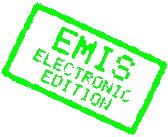On maximal actions and w -maximal actions of finite hypergroups
Bangteng Xu
Eastern Kentucky University Department of Mathematics and Statistics Richmond KY 40475 USA
DOI: 10.1007/s10801-007-0082-3
Abstract
Sunder and Wildberger ( J. Algebr. Comb. 18, 135-151, 2003) introduced the notion of actions of finite hypergroups, and studied maximal irreducible actions and *-actions. One of the main results of Sunder and Wildberger states that if a finite hypergroup K admits an irreducible action which is both a maximal action and a *-action, then K arises from an association scheme. In this paper we will first show that an irreducible maximal action must be a *-action, and hence improve Sunder and Wildberger's result (Theorem 2.9). Another important type of actions is the so-called w-maximal actions. For a w-maximal action π : K\rightarrow Aff\thinspace ( X), we will prove that π is faithful and | X|\geq | K|, and | K| is the best possible lower bound of | X|. We will also discuss the strong connectivity of the digraphs induced by a w-maximal action.
Pages: 127–141
Keywords: keywords hypergroups; association schemes; actions; maximal actions; *-actions; $w$-maximal actions
Full Text: PDF
References
1. Arad, Z., Erez, Y., & Muzychuk, M. (2003). On even generalized table algebras. Journal of Algebraic Combinatorics, 17(2), 163-170.
2. Arad, Z., Fisman, E., & Muzychuk, M. (1999). Generalized table algebras. Israel Journal of Mathe- matics, 114, 29-60.
3. Brouwer, A., Cohen, A., & Neumaier, A. (1989). Distance-regular graphs. Berlin: Springer.
4. Bannai, E., & Ito, T. (1984). Algebraic combinatorics I: association schemes. Menlo Park: Benjamin/Cummings.
5. Blau, H., & Zieschang, P. (2004). Sylow theory for table algebras, fusion algebras, and hypergroups. Journal of Algebra, 273, 551-570.
6. Obata, N., & Wildberger, N. J. (1996). Generalized hypergroups and orthogonal polynomials. Nagoya Mathematical Journal, 142, 67-93.
7. Suzuki, H. (1998). Imprimitive Q-polynomial association schemes. Journal of Algebraic Combinatorics, 7, 165-180.
8. Sunder, V. S., & Wildberger, N. J. (2003). Actions of finite hypergroups. Journal of Algebraic Combinatorics, 18(2), 135-151.
9. Wildberger, N. J. (1997). Duality and entropy for finite abelian hypergroups and fusion rule algebras. The Journal of the London Mathematical Society, 56(2), 275-291.
10. Xu, B. (2006). Table algebras with multiple P-polynomial structures. Journal of Algebraic Combinatorics, 23, 377-393.
2. Arad, Z., Fisman, E., & Muzychuk, M. (1999). Generalized table algebras. Israel Journal of Mathe- matics, 114, 29-60.
3. Brouwer, A., Cohen, A., & Neumaier, A. (1989). Distance-regular graphs. Berlin: Springer.
4. Bannai, E., & Ito, T. (1984). Algebraic combinatorics I: association schemes. Menlo Park: Benjamin/Cummings.
5. Blau, H., & Zieschang, P. (2004). Sylow theory for table algebras, fusion algebras, and hypergroups. Journal of Algebra, 273, 551-570.
6. Obata, N., & Wildberger, N. J. (1996). Generalized hypergroups and orthogonal polynomials. Nagoya Mathematical Journal, 142, 67-93.
7. Suzuki, H. (1998). Imprimitive Q-polynomial association schemes. Journal of Algebraic Combinatorics, 7, 165-180.
8. Sunder, V. S., & Wildberger, N. J. (2003). Actions of finite hypergroups. Journal of Algebraic Combinatorics, 18(2), 135-151.
9. Wildberger, N. J. (1997). Duality and entropy for finite abelian hypergroups and fusion rule algebras. The Journal of the London Mathematical Society, 56(2), 275-291.
10. Xu, B. (2006). Table algebras with multiple P-polynomial structures. Journal of Algebraic Combinatorics, 23, 377-393.
